Reflective Journal: Analysis of CSR Task and Employability Skills
VerifiedAdded on 2023/01/13
|7
|1930
|21
Report
AI Summary
This report is a reflective journal analyzing a Corporate Social Responsibility (CSR) project undertaken by a student, using the Gibbs Reflective Model to evaluate the experience. The journal details the initial research phase, the student's role in compiling and filtering data, and the collaborative aspects of teamwork. It explores the student's feelings throughout the project, from initial excitement to the satisfaction of contributing effectively. The evaluation section discusses the positive aspects of teamwork, cooperation, and the development of skills, while also acknowledging conflicts and disagreements. The analysis focuses on lessons learned regarding teamwork, communication, and problem-solving. The conclusion summarizes the key takeaways, including the importance of clear leadership and delegation. Finally, an action plan is developed, outlining how to approach similar situations in the future, emphasizing the need for effective communication, and the development of essential skills for better handling similar situations.
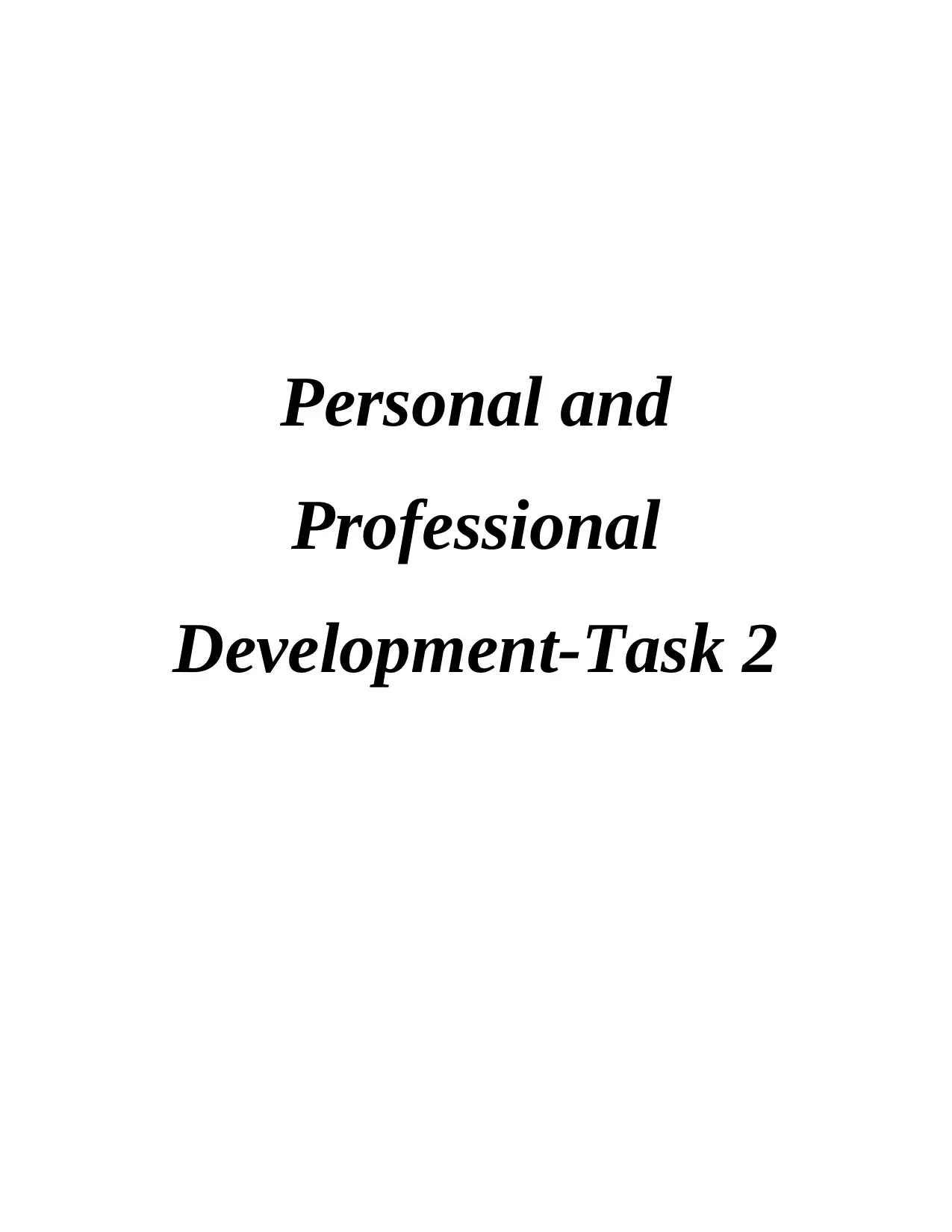
Personal and
Professional
Development-Task 2
Professional
Development-Task 2
Paraphrase This Document
Need a fresh take? Get an instant paraphrase of this document with our AI Paraphraser
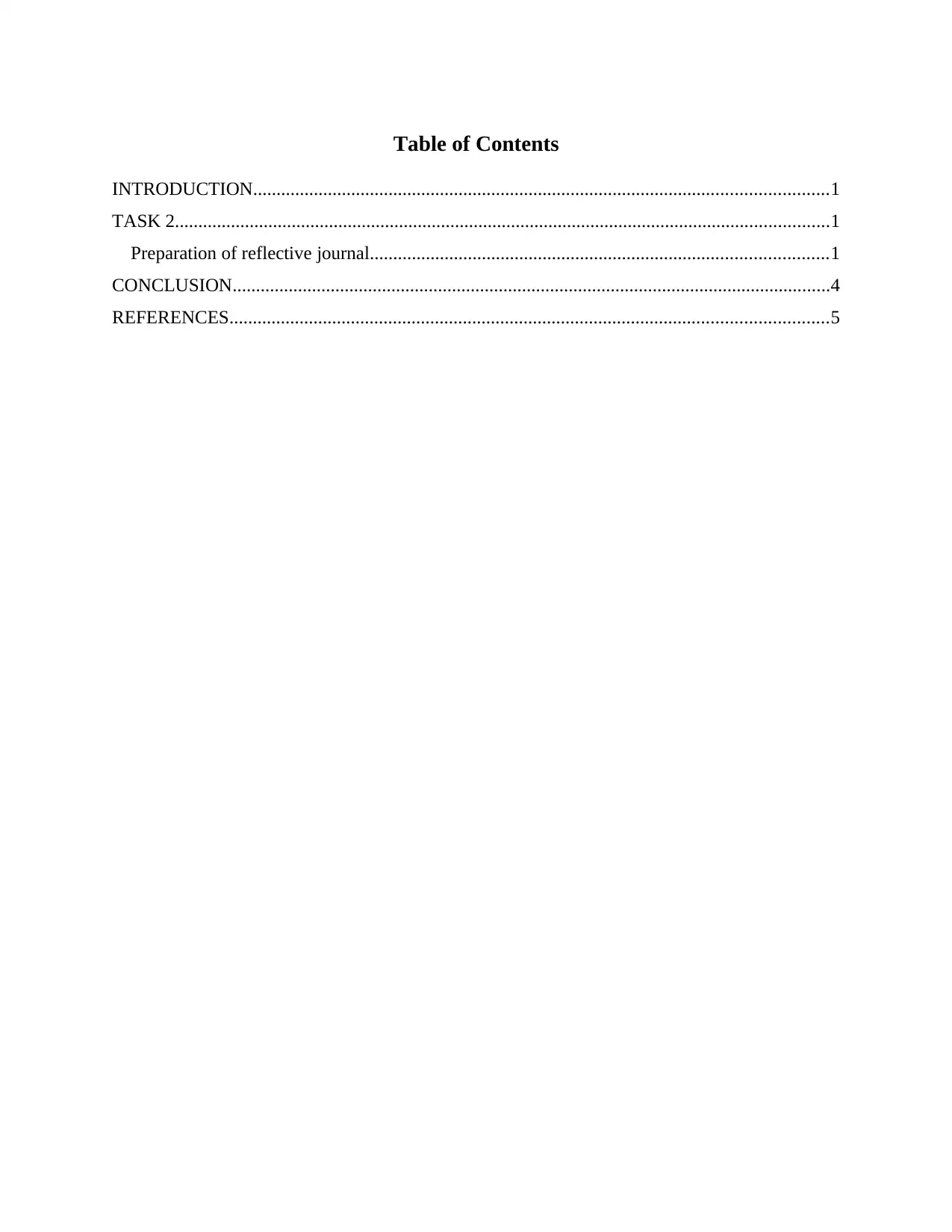
Table of Contents
INTRODUCTION...........................................................................................................................1
TASK 2............................................................................................................................................1
Preparation of reflective journal..................................................................................................1
CONCLUSION................................................................................................................................4
REFERENCES................................................................................................................................5
INTRODUCTION...........................................................................................................................1
TASK 2............................................................................................................................................1
Preparation of reflective journal..................................................................................................1
CONCLUSION................................................................................................................................4
REFERENCES................................................................................................................................5
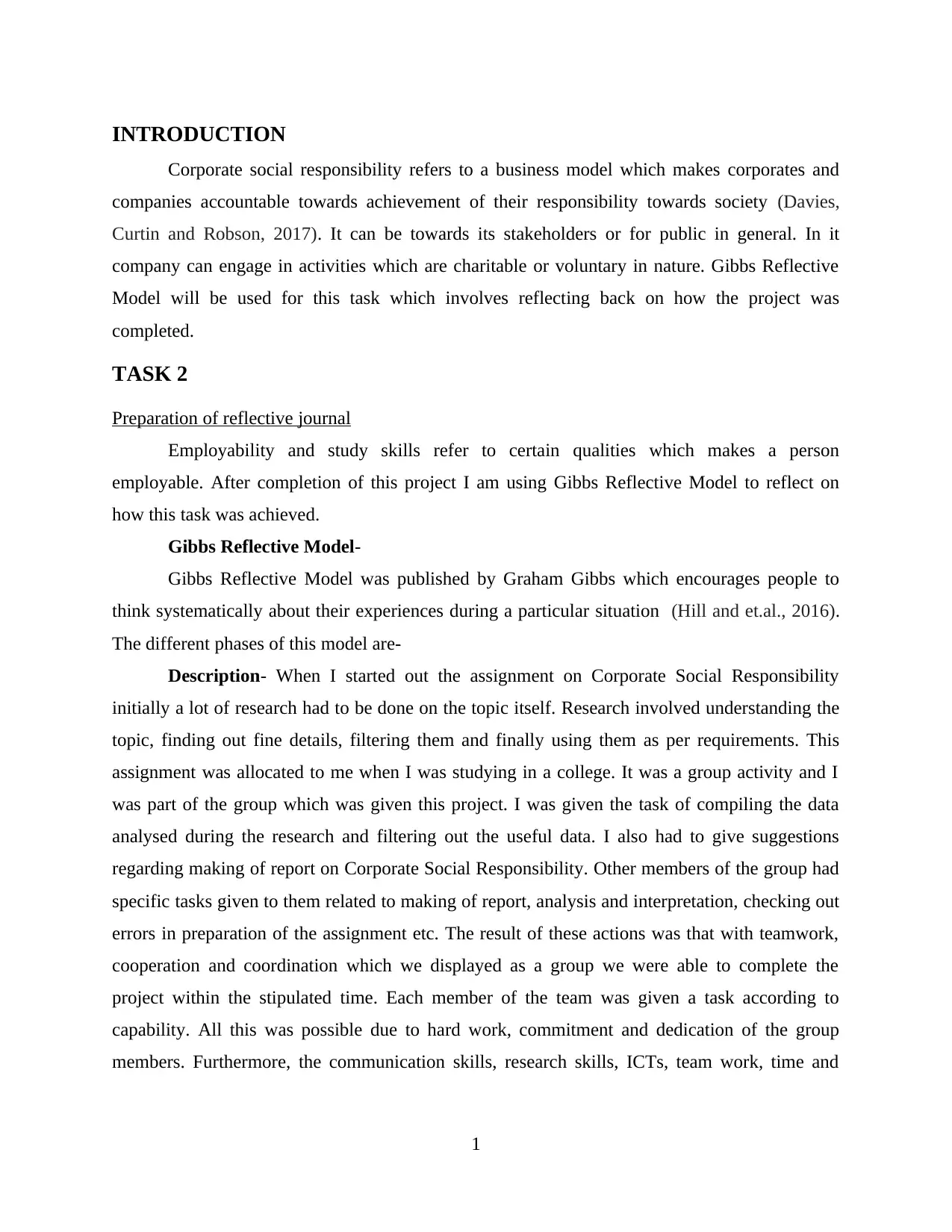
INTRODUCTION
Corporate social responsibility refers to a business model which makes corporates and
companies accountable towards achievement of their responsibility towards society (Davies,
Curtin and Robson, 2017). It can be towards its stakeholders or for public in general. In it
company can engage in activities which are charitable or voluntary in nature. Gibbs Reflective
Model will be used for this task which involves reflecting back on how the project was
completed.
TASK 2
Preparation of reflective journal
Employability and study skills refer to certain qualities which makes a person
employable. After completion of this project I am using Gibbs Reflective Model to reflect on
how this task was achieved.
Gibbs Reflective Model-
Gibbs Reflective Model was published by Graham Gibbs which encourages people to
think systematically about their experiences during a particular situation (Hill and et.al., 2016).
The different phases of this model are-
Description- When I started out the assignment on Corporate Social Responsibility
initially a lot of research had to be done on the topic itself. Research involved understanding the
topic, finding out fine details, filtering them and finally using them as per requirements. This
assignment was allocated to me when I was studying in a college. It was a group activity and I
was part of the group which was given this project. I was given the task of compiling the data
analysed during the research and filtering out the useful data. I also had to give suggestions
regarding making of report on Corporate Social Responsibility. Other members of the group had
specific tasks given to them related to making of report, analysis and interpretation, checking out
errors in preparation of the assignment etc. The result of these actions was that with teamwork,
cooperation and coordination which we displayed as a group we were able to complete the
project within the stipulated time. Each member of the team was given a task according to
capability. All this was possible due to hard work, commitment and dedication of the group
members. Furthermore, the communication skills, research skills, ICTs, team work, time and
1
Corporate social responsibility refers to a business model which makes corporates and
companies accountable towards achievement of their responsibility towards society (Davies,
Curtin and Robson, 2017). It can be towards its stakeholders or for public in general. In it
company can engage in activities which are charitable or voluntary in nature. Gibbs Reflective
Model will be used for this task which involves reflecting back on how the project was
completed.
TASK 2
Preparation of reflective journal
Employability and study skills refer to certain qualities which makes a person
employable. After completion of this project I am using Gibbs Reflective Model to reflect on
how this task was achieved.
Gibbs Reflective Model-
Gibbs Reflective Model was published by Graham Gibbs which encourages people to
think systematically about their experiences during a particular situation (Hill and et.al., 2016).
The different phases of this model are-
Description- When I started out the assignment on Corporate Social Responsibility
initially a lot of research had to be done on the topic itself. Research involved understanding the
topic, finding out fine details, filtering them and finally using them as per requirements. This
assignment was allocated to me when I was studying in a college. It was a group activity and I
was part of the group which was given this project. I was given the task of compiling the data
analysed during the research and filtering out the useful data. I also had to give suggestions
regarding making of report on Corporate Social Responsibility. Other members of the group had
specific tasks given to them related to making of report, analysis and interpretation, checking out
errors in preparation of the assignment etc. The result of these actions was that with teamwork,
cooperation and coordination which we displayed as a group we were able to complete the
project within the stipulated time. Each member of the team was given a task according to
capability. All this was possible due to hard work, commitment and dedication of the group
members. Furthermore, the communication skills, research skills, ICTs, team work, time and
1
⊘ This is a preview!⊘
Do you want full access?
Subscribe today to unlock all pages.

Trusted by 1+ million students worldwide
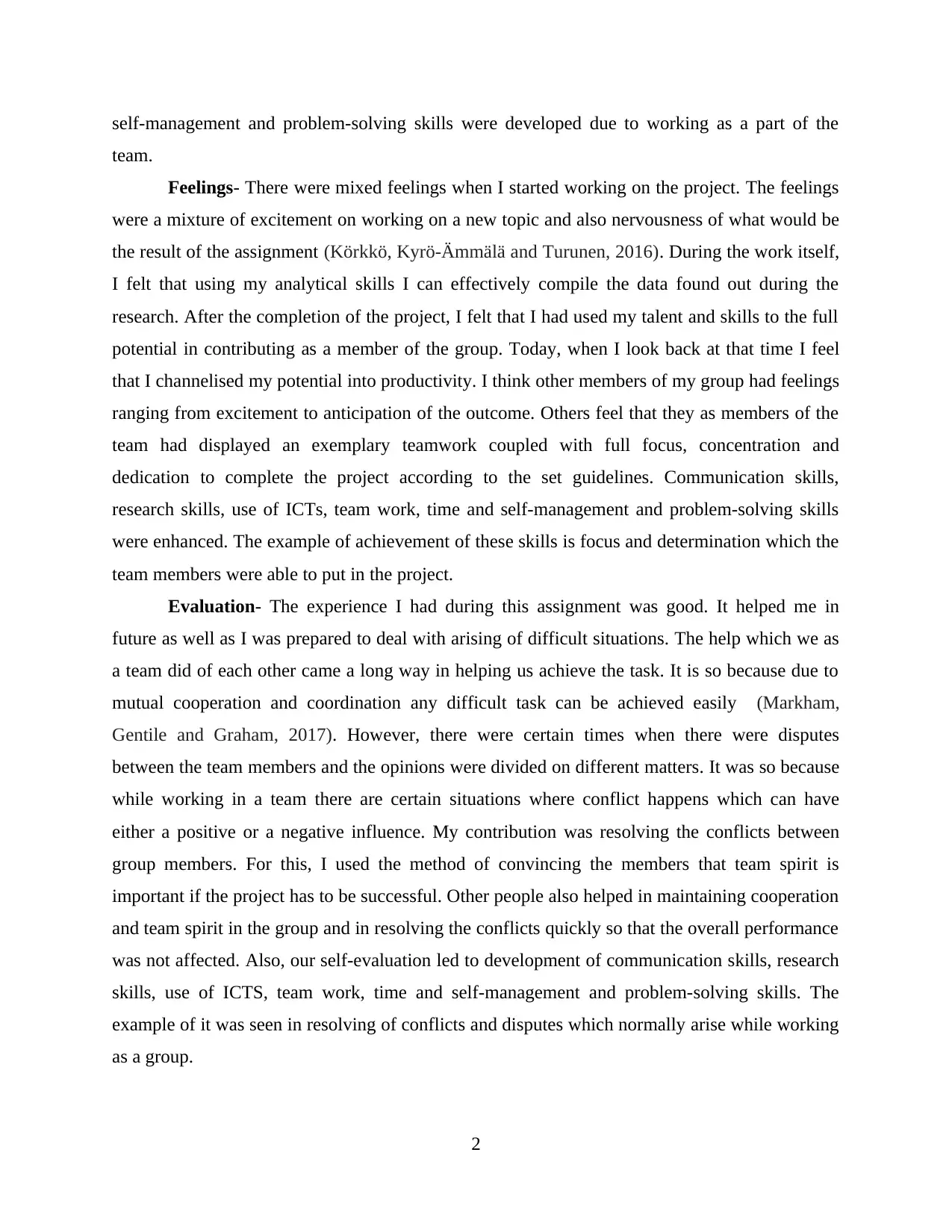
self-management and problem-solving skills were developed due to working as a part of the
team.
Feelings- There were mixed feelings when I started working on the project. The feelings
were a mixture of excitement on working on a new topic and also nervousness of what would be
the result of the assignment (Körkkö, Kyrö-Ämmälä and Turunen, 2016). During the work itself,
I felt that using my analytical skills I can effectively compile the data found out during the
research. After the completion of the project, I felt that I had used my talent and skills to the full
potential in contributing as a member of the group. Today, when I look back at that time I feel
that I channelised my potential into productivity. I think other members of my group had feelings
ranging from excitement to anticipation of the outcome. Others feel that they as members of the
team had displayed an exemplary teamwork coupled with full focus, concentration and
dedication to complete the project according to the set guidelines. Communication skills,
research skills, use of ICTs, team work, time and self-management and problem-solving skills
were enhanced. The example of achievement of these skills is focus and determination which the
team members were able to put in the project.
Evaluation- The experience I had during this assignment was good. It helped me in
future as well as I was prepared to deal with arising of difficult situations. The help which we as
a team did of each other came a long way in helping us achieve the task. It is so because due to
mutual cooperation and coordination any difficult task can be achieved easily (Markham,
Gentile and Graham, 2017). However, there were certain times when there were disputes
between the team members and the opinions were divided on different matters. It was so because
while working in a team there are certain situations where conflict happens which can have
either a positive or a negative influence. My contribution was resolving the conflicts between
group members. For this, I used the method of convincing the members that team spirit is
important if the project has to be successful. Other people also helped in maintaining cooperation
and team spirit in the group and in resolving the conflicts quickly so that the overall performance
was not affected. Also, our self-evaluation led to development of communication skills, research
skills, use of ICTS, team work, time and self-management and problem-solving skills. The
example of it was seen in resolving of conflicts and disputes which normally arise while working
as a group.
2
team.
Feelings- There were mixed feelings when I started working on the project. The feelings
were a mixture of excitement on working on a new topic and also nervousness of what would be
the result of the assignment (Körkkö, Kyrö-Ämmälä and Turunen, 2016). During the work itself,
I felt that using my analytical skills I can effectively compile the data found out during the
research. After the completion of the project, I felt that I had used my talent and skills to the full
potential in contributing as a member of the group. Today, when I look back at that time I feel
that I channelised my potential into productivity. I think other members of my group had feelings
ranging from excitement to anticipation of the outcome. Others feel that they as members of the
team had displayed an exemplary teamwork coupled with full focus, concentration and
dedication to complete the project according to the set guidelines. Communication skills,
research skills, use of ICTs, team work, time and self-management and problem-solving skills
were enhanced. The example of achievement of these skills is focus and determination which the
team members were able to put in the project.
Evaluation- The experience I had during this assignment was good. It helped me in
future as well as I was prepared to deal with arising of difficult situations. The help which we as
a team did of each other came a long way in helping us achieve the task. It is so because due to
mutual cooperation and coordination any difficult task can be achieved easily (Markham,
Gentile and Graham, 2017). However, there were certain times when there were disputes
between the team members and the opinions were divided on different matters. It was so because
while working in a team there are certain situations where conflict happens which can have
either a positive or a negative influence. My contribution was resolving the conflicts between
group members. For this, I used the method of convincing the members that team spirit is
important if the project has to be successful. Other people also helped in maintaining cooperation
and team spirit in the group and in resolving the conflicts quickly so that the overall performance
was not affected. Also, our self-evaluation led to development of communication skills, research
skills, use of ICTS, team work, time and self-management and problem-solving skills. The
example of it was seen in resolving of conflicts and disputes which normally arise while working
as a group.
2
Paraphrase This Document
Need a fresh take? Get an instant paraphrase of this document with our AI Paraphraser
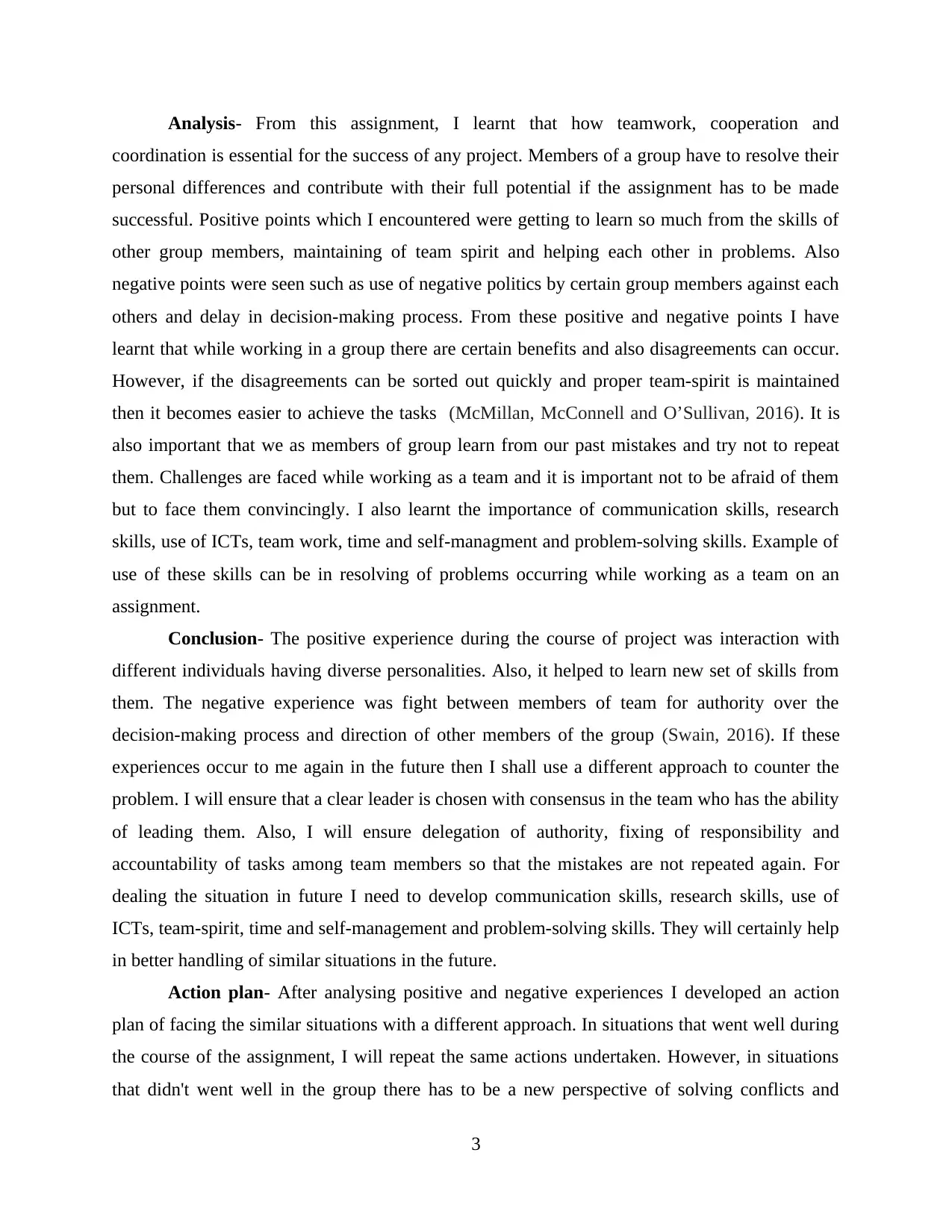
Analysis- From this assignment, I learnt that how teamwork, cooperation and
coordination is essential for the success of any project. Members of a group have to resolve their
personal differences and contribute with their full potential if the assignment has to be made
successful. Positive points which I encountered were getting to learn so much from the skills of
other group members, maintaining of team spirit and helping each other in problems. Also
negative points were seen such as use of negative politics by certain group members against each
others and delay in decision-making process. From these positive and negative points I have
learnt that while working in a group there are certain benefits and also disagreements can occur.
However, if the disagreements can be sorted out quickly and proper team-spirit is maintained
then it becomes easier to achieve the tasks (McMillan, McConnell and O’Sullivan, 2016). It is
also important that we as members of group learn from our past mistakes and try not to repeat
them. Challenges are faced while working as a team and it is important not to be afraid of them
but to face them convincingly. I also learnt the importance of communication skills, research
skills, use of ICTs, team work, time and self-managment and problem-solving skills. Example of
use of these skills can be in resolving of problems occurring while working as a team on an
assignment.
Conclusion- The positive experience during the course of project was interaction with
different individuals having diverse personalities. Also, it helped to learn new set of skills from
them. The negative experience was fight between members of team for authority over the
decision-making process and direction of other members of the group (Swain, 2016). If these
experiences occur to me again in the future then I shall use a different approach to counter the
problem. I will ensure that a clear leader is chosen with consensus in the team who has the ability
of leading them. Also, I will ensure delegation of authority, fixing of responsibility and
accountability of tasks among team members so that the mistakes are not repeated again. For
dealing the situation in future I need to develop communication skills, research skills, use of
ICTs, team-spirit, time and self-management and problem-solving skills. They will certainly help
in better handling of similar situations in the future.
Action plan- After analysing positive and negative experiences I developed an action
plan of facing the similar situations with a different approach. In situations that went well during
the course of the assignment, I will repeat the same actions undertaken. However, in situations
that didn't went well in the group there has to be a new perspective of solving conflicts and
3
coordination is essential for the success of any project. Members of a group have to resolve their
personal differences and contribute with their full potential if the assignment has to be made
successful. Positive points which I encountered were getting to learn so much from the skills of
other group members, maintaining of team spirit and helping each other in problems. Also
negative points were seen such as use of negative politics by certain group members against each
others and delay in decision-making process. From these positive and negative points I have
learnt that while working in a group there are certain benefits and also disagreements can occur.
However, if the disagreements can be sorted out quickly and proper team-spirit is maintained
then it becomes easier to achieve the tasks (McMillan, McConnell and O’Sullivan, 2016). It is
also important that we as members of group learn from our past mistakes and try not to repeat
them. Challenges are faced while working as a team and it is important not to be afraid of them
but to face them convincingly. I also learnt the importance of communication skills, research
skills, use of ICTs, team work, time and self-managment and problem-solving skills. Example of
use of these skills can be in resolving of problems occurring while working as a team on an
assignment.
Conclusion- The positive experience during the course of project was interaction with
different individuals having diverse personalities. Also, it helped to learn new set of skills from
them. The negative experience was fight between members of team for authority over the
decision-making process and direction of other members of the group (Swain, 2016). If these
experiences occur to me again in the future then I shall use a different approach to counter the
problem. I will ensure that a clear leader is chosen with consensus in the team who has the ability
of leading them. Also, I will ensure delegation of authority, fixing of responsibility and
accountability of tasks among team members so that the mistakes are not repeated again. For
dealing the situation in future I need to develop communication skills, research skills, use of
ICTs, team-spirit, time and self-management and problem-solving skills. They will certainly help
in better handling of similar situations in the future.
Action plan- After analysing positive and negative experiences I developed an action
plan of facing the similar situations with a different approach. In situations that went well during
the course of the assignment, I will repeat the same actions undertaken. However, in situations
that didn't went well in the group there has to be a new perspective of solving conflicts and
3
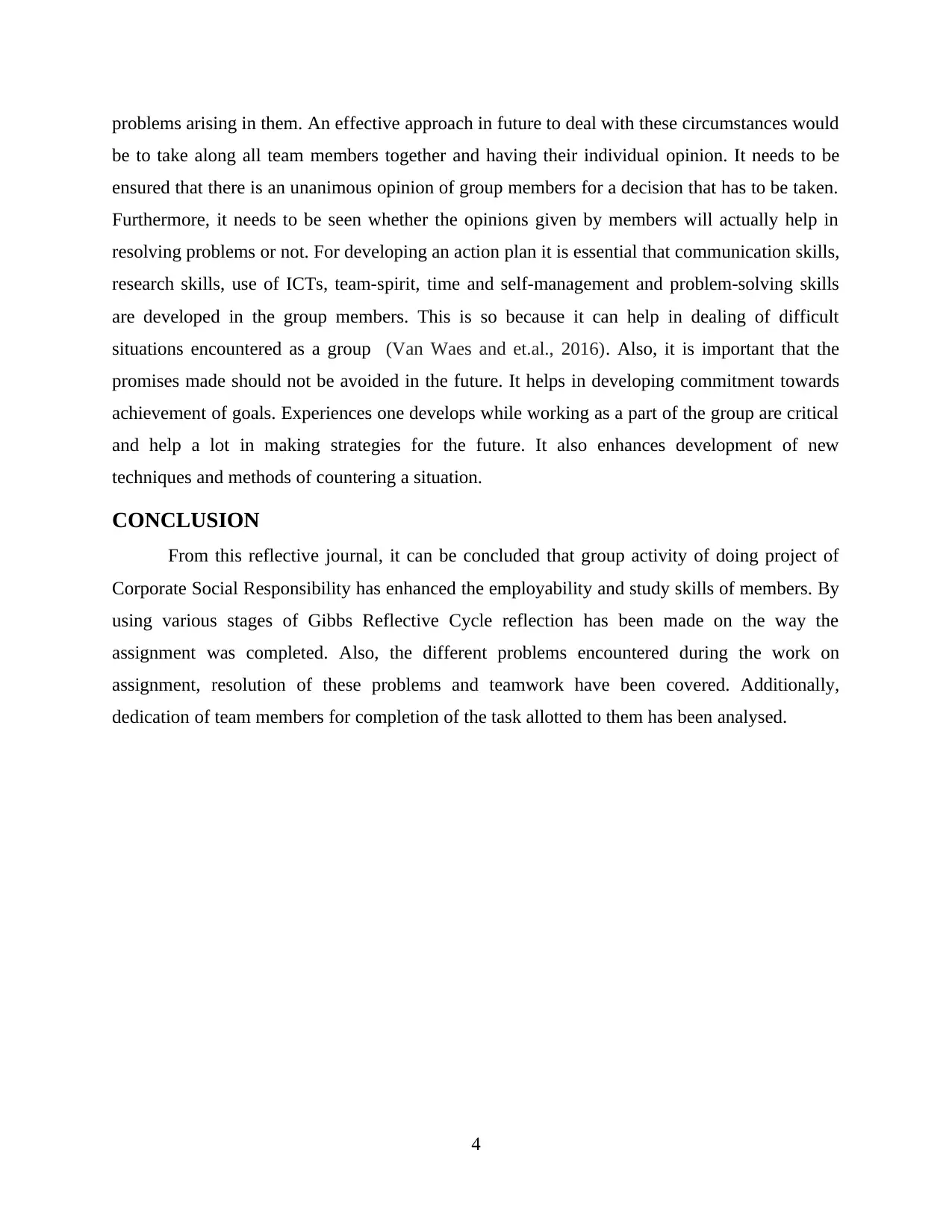
problems arising in them. An effective approach in future to deal with these circumstances would
be to take along all team members together and having their individual opinion. It needs to be
ensured that there is an unanimous opinion of group members for a decision that has to be taken.
Furthermore, it needs to be seen whether the opinions given by members will actually help in
resolving problems or not. For developing an action plan it is essential that communication skills,
research skills, use of ICTs, team-spirit, time and self-management and problem-solving skills
are developed in the group members. This is so because it can help in dealing of difficult
situations encountered as a group (Van Waes and et.al., 2016). Also, it is important that the
promises made should not be avoided in the future. It helps in developing commitment towards
achievement of goals. Experiences one develops while working as a part of the group are critical
and help a lot in making strategies for the future. It also enhances development of new
techniques and methods of countering a situation.
CONCLUSION
From this reflective journal, it can be concluded that group activity of doing project of
Corporate Social Responsibility has enhanced the employability and study skills of members. By
using various stages of Gibbs Reflective Cycle reflection has been made on the way the
assignment was completed. Also, the different problems encountered during the work on
assignment, resolution of these problems and teamwork have been covered. Additionally,
dedication of team members for completion of the task allotted to them has been analysed.
4
be to take along all team members together and having their individual opinion. It needs to be
ensured that there is an unanimous opinion of group members for a decision that has to be taken.
Furthermore, it needs to be seen whether the opinions given by members will actually help in
resolving problems or not. For developing an action plan it is essential that communication skills,
research skills, use of ICTs, team-spirit, time and self-management and problem-solving skills
are developed in the group members. This is so because it can help in dealing of difficult
situations encountered as a group (Van Waes and et.al., 2016). Also, it is important that the
promises made should not be avoided in the future. It helps in developing commitment towards
achievement of goals. Experiences one develops while working as a part of the group are critical
and help a lot in making strategies for the future. It also enhances development of new
techniques and methods of countering a situation.
CONCLUSION
From this reflective journal, it can be concluded that group activity of doing project of
Corporate Social Responsibility has enhanced the employability and study skills of members. By
using various stages of Gibbs Reflective Cycle reflection has been made on the way the
assignment was completed. Also, the different problems encountered during the work on
assignment, resolution of these problems and teamwork have been covered. Additionally,
dedication of team members for completion of the task allotted to them has been analysed.
4
⊘ This is a preview!⊘
Do you want full access?
Subscribe today to unlock all pages.

Trusted by 1+ million students worldwide
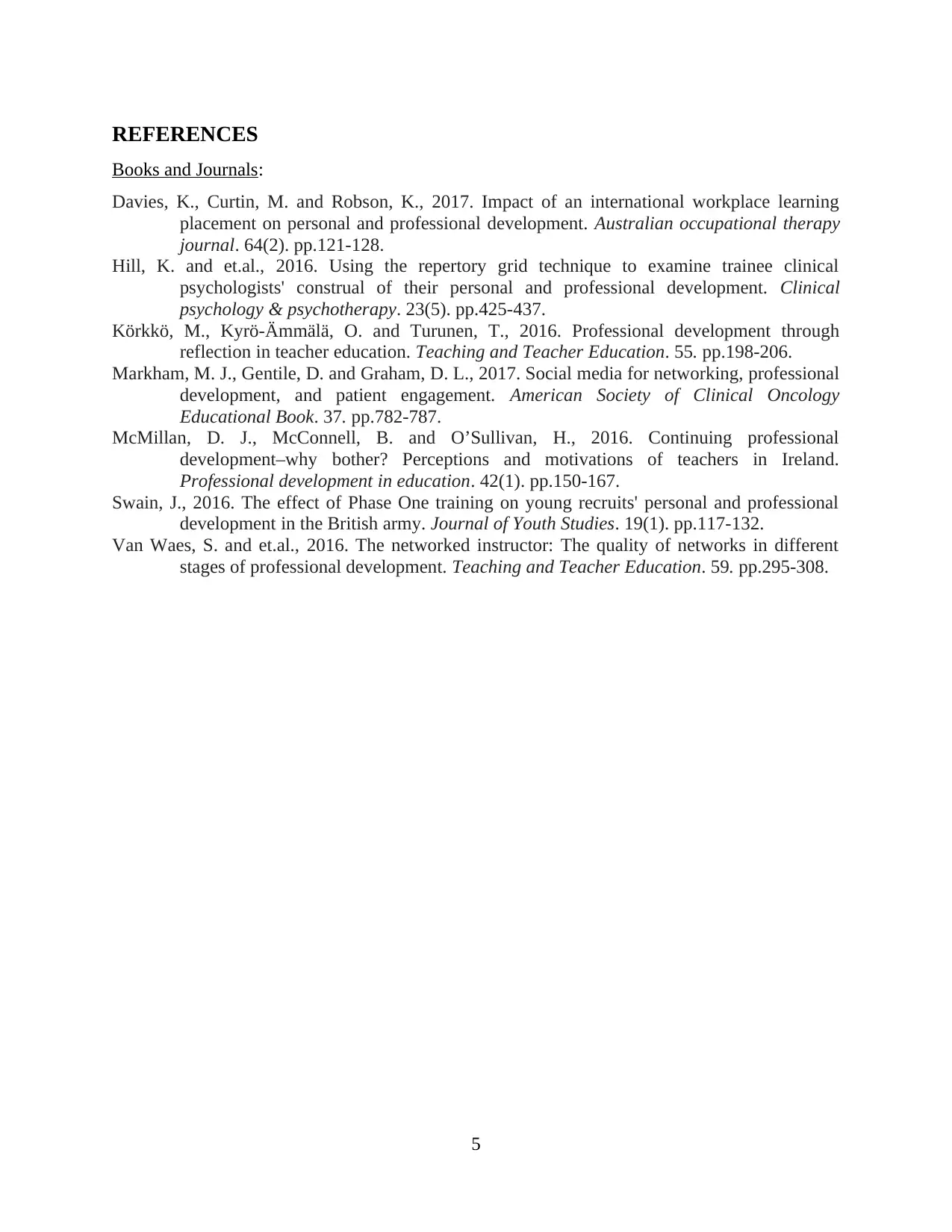
REFERENCES
Books and Journals:
Davies, K., Curtin, M. and Robson, K., 2017. Impact of an international workplace learning
placement on personal and professional development. Australian occupational therapy
journal. 64(2). pp.121-128.
Hill, K. and et.al., 2016. Using the repertory grid technique to examine trainee clinical
psychologists' construal of their personal and professional development. Clinical
psychology & psychotherapy. 23(5). pp.425-437.
Körkkö, M., Kyrö-Ämmälä, O. and Turunen, T., 2016. Professional development through
reflection in teacher education. Teaching and Teacher Education. 55. pp.198-206.
Markham, M. J., Gentile, D. and Graham, D. L., 2017. Social media for networking, professional
development, and patient engagement. American Society of Clinical Oncology
Educational Book. 37. pp.782-787.
McMillan, D. J., McConnell, B. and O’Sullivan, H., 2016. Continuing professional
development–why bother? Perceptions and motivations of teachers in Ireland.
Professional development in education. 42(1). pp.150-167.
Swain, J., 2016. The effect of Phase One training on young recruits' personal and professional
development in the British army. Journal of Youth Studies. 19(1). pp.117-132.
Van Waes, S. and et.al., 2016. The networked instructor: The quality of networks in different
stages of professional development. Teaching and Teacher Education. 59. pp.295-308.
5
Books and Journals:
Davies, K., Curtin, M. and Robson, K., 2017. Impact of an international workplace learning
placement on personal and professional development. Australian occupational therapy
journal. 64(2). pp.121-128.
Hill, K. and et.al., 2016. Using the repertory grid technique to examine trainee clinical
psychologists' construal of their personal and professional development. Clinical
psychology & psychotherapy. 23(5). pp.425-437.
Körkkö, M., Kyrö-Ämmälä, O. and Turunen, T., 2016. Professional development through
reflection in teacher education. Teaching and Teacher Education. 55. pp.198-206.
Markham, M. J., Gentile, D. and Graham, D. L., 2017. Social media for networking, professional
development, and patient engagement. American Society of Clinical Oncology
Educational Book. 37. pp.782-787.
McMillan, D. J., McConnell, B. and O’Sullivan, H., 2016. Continuing professional
development–why bother? Perceptions and motivations of teachers in Ireland.
Professional development in education. 42(1). pp.150-167.
Swain, J., 2016. The effect of Phase One training on young recruits' personal and professional
development in the British army. Journal of Youth Studies. 19(1). pp.117-132.
Van Waes, S. and et.al., 2016. The networked instructor: The quality of networks in different
stages of professional development. Teaching and Teacher Education. 59. pp.295-308.
5
1 out of 7
Related Documents
Your All-in-One AI-Powered Toolkit for Academic Success.
+13062052269
info@desklib.com
Available 24*7 on WhatsApp / Email
![[object Object]](/_next/static/media/star-bottom.7253800d.svg)
Unlock your academic potential
Copyright © 2020–2026 A2Z Services. All Rights Reserved. Developed and managed by ZUCOL.





